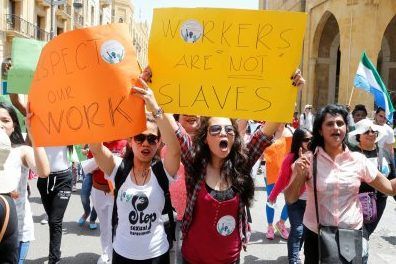Currently, migrant domestic workers in Lebanon are working under the kafala system – in which they are sponsored by their Lebanese employers, and may not work for anyone else – and are excluded from the country’s labour laws. There have been reports of mistreatment of migrant domestic workers including incidents of beatings, sexual abuse, withholding of passports and working long hours. Suicides and suicide attempts have been reported among the migrant domestic workers, including a maid who committed suicide through hanging herself at her employer’s apartment in Tripoli. She had been on hunger strike for three days previously, Lebanon’s Labour Ministry said, because she had not been allowed to return to Bangladesh to see her children.
The Arab world’s first labour union was set up in Lebanon in 2015. Leticia, a Filipina who was assaulted and raped by her employer several years ago, says, “We want to be treated like human beings, like real workers. With this union, I will no longer feel alone in the face of abuse.”
The Lebanese Labour Ministry calls this union illegal. The National Federation of Workers’ Unions in Lebanon (Fenasol), states that the country has a quarter of a million migrant domestic workers, but they do not have adequate protection or recognition from the government. Their Labour Minister, Sejaane Azzi, said it is a fact that the law doesn’t allow foreigners to set up a union, and said that he agreed that “new laws are needed to improve the situation for housemaids”.
Human Rights Watch is also concerned that authorities in Lebanon are not renewing residence permits for children born to migrant domestic workers and are actually deporting those children. This is a practice that separates children from their mothers.
The World Cup 2022 has brought these labour abuses to the forefront, because of the unfair treatment of migrant employees as Qatar builds new facilities for the event.







Freedom United is interested in hearing from our community and welcomes relevant, informed comments, advice, and insights that advance the conversation around our campaigns and advocacy. We value inclusivity and respect within our community. To be approved, your comments should be civil.